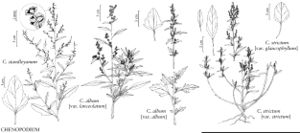Chenopodium strictum
Nov. Pl. Sp., 180. 1821.
Stems erect, branched, 4.5–10 dm, glabrous to sparsely farinose. Leaves nonaromatic, sessile; proximal blades oblong-ovate to ovate-lanceolate, 1.7–3.6 × 1–2.8 cm, base cuneate, margins finely serrate; distal blades tending toward lanceolate and margins entire, apex obtuse, farinose. Inflorescences glomerules in terminal moniliform spikes, 1–3 cm; glomerules globose, 1.8–2 mm diam.; bracts absent. Flowers: perianth segments 5, distinct nearly to base; lobes ovate, 0.5–0.7 × 0.6–0.7 mm, apex rounded, farinose, slightly keeled, reflexed and exposing fruit at maturity; stamens 5; stigmas 2, 0.2 mm. Achenes depressed-ovoid; pericarp adherent, smooth. Seeds lenticular, oval, 0.9–1.5 mm diam.; seed-coat black, smooth, margins rounded. 2n = 36.
Phenology: Fruiting fall.
Habitat: Disturbed, weedy areas
Elevation: 0-600 m
Distribution
Introduced; B.C., Man., Ont., P.E.I., Que., Sask., Ariz., Ark., Calif., Colo., Conn., Fla., Iowa, Kans., Maine, Mass., Mich., Minn., Mo., Nebr., N.H., N.J., N.Y., N.Dak., Pa., R.I., S.Dak., Vt., Wash., native se Europe, s, c Asia
Discussion
Presumed native American plants of Chenopodium strictum were recognized as a separate species, subspecies, or variety [C. glaucophyllum Aellen; C. strictum subsp. glaucophyllum (Aellen) Aellen; C. strictum var. glaucophyllum (Aellen) Wahl]. These plants are very variable, and usually have broader leaves and more lax inflorescences, which might be a result of hybridization with other species of the C. album aggregate. The native status of such forms is very questionable. Typical C. strictum also occurs in North America, but seems to be less common. Some narrow species and hybrids of the C. strictum aggregate are recognized in Eurasia (P. Aellen 1928; F. Dvo ák 1989; P. Uotila 1977, 1993, 1997). Some of these taxa, especially C. striatiforme Murr and C. novopokrovskyanum (Aellen) Uotila, are superficially similar to the native North American taxa of subsect. Leptophylla. Eurasian forms of the C. strictum group usually can be distinguished by their venation pattern (in most cases more than three visible veins even in narrowest leaves). Considering the likely alien status and wide variability of C. strictum in North America, no attempt is made here to subdivide it into infraspecific entities.
Selected References
None.
Lower Taxa
"narrower" is not a number."dm" is not declared as a valid unit of measurement for this property.
